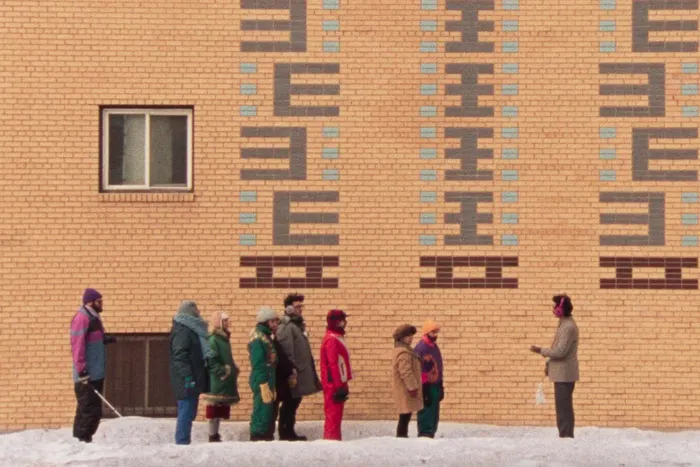Matthew Rankin, Pirouz Nemati and Ila Firouzabadi’s Universal Language blends absurdist comedy, childlike wonder and alternative history into a cultural melting pot worth digging into.
Offering a tender and light-hearted satire, Rankin creates a Winnipeg formed by Iranian sensibilities and cultures that – despite what the brutalist architecture of its schoolyards and city streets would have you believe – is anything but oppressive. In fact, Negin (Rojina Esmaeili) and the rest of her classmates are taught to value their intelligence. With aspiring neuroscientists, fashionistas and donkey breeders among them, many have career dreams far exceeding that of regular elementary school students. And while their grouch of a homeroom/French Immersion teacher Iraj (Mani Soleymanlou) is certainly far from kind, he’s not above tolerating misbehaviour (so long as they do it in french).
It’s a far cry from the depressingly grey walls of the Quebec Consulate where Rankin – playing a fictional counterpart of himself – finds himself working. As his resignation is accompanied by the wails of his faceless co-worker, it’s clear that Rankin needs a slight seachange, and what better excuse does he need than to return to his homeland of Winnipeg to visit his ailing mother.
But as Negin covers for her friend Omid when he forgets to bring his glasses, chalking up the incident to a run in with a rogue turkey, a class wide suspension will lead Matthew and the two trouble-makers toward working together in a wild poultry chase around the city.
Despite its quirky set-up, Jacque Tati inspired sight-gags and juvenile whimsy, the film’s joys are anything but empty. Far from satisfied with surface level appeals to Iranian culture, Rankin encourages fellow writers Nemati and Firouzabadi to envision a Winnipeg wholly sharing both Eastern and Western values. Tim Horton’s turns from a gentrified coffee shop to steamy (if still gentrified) tea house. Local streets are brimming with birthday cake peddlers and Kleenex dispensaries, the latter of which are presented like ornate flower shops (although there’s plenty of those too). Adapting to Canada’s much colder climate, the people of Universal Language are no less draped in layers of clothing, but Burqas and Keffiyehs are shed for equally intricate and well crafted ear muffs and snow jackets. Even some of the older men – like the owner of the local deli – wear ten gallon hats and all white like their southern mogul counterparts in the States. Canada and Iran are not separate cultures to the film, and letting them co-exist is not a compromise, but a benefit.
What’s funniest about the film is how normal this strange world feels. Bingo halls run by dolled up drag kings and queens, Old women arguing with female bus drivers over having to sit next to a turkey, and children having more respect, authority and intelligence than the adults around them, feel as plain as breathing. Because that’s how it should be in a world without fear. A world where a woman’s biggest gripe is having to deal with serial complainers on her bus, and where a child’s biggest worry is being berated by his teacher for forgetting his glasses. Modeled after the same school that gave Abbas Kiarostami – the film’s biggest inspiration – his start, the “Winnipeg Institute for Intellectual Development of Children and Young People” presents the film “In the name of friendship.” And in a sense, the film itself stands strong because of years-long friendship between Rankin, Nemati and Firouzabadi. Their deep understanding of each other's languages, cultures and humor allows their camaraderie to leak into the film.
What’s more, the film makes an argument for living in culture rather than experiencing it. In a rather humorous recurring bit. A tour guide, Massoud (played by Nemati) drags a group of travellers to different Canadian heritage sites – or lack there of in the case of a fountain in a rundown mall. As he stumbles through half remembered speeches and struggles to answer any of his patrons questions, it seems neither their host, or the tourists themselves care much for the current culture. Most of our insights of Winnipeg come from Matthew’s strolls through back alleys, into parking lots and past traffic jams. Even as a former local, Matthew’s drive to discover who he is now that he’s back home allows us to get to know the real culture of Winnipeg.
Unfortunately, for a film filled with such humor and hope, Universal Language has an uncharacteristically somber ending, as Rankin, in an effort to come to terms with his own feelings as a director, forces Matthew to confront his mother’s condition and his ultimate fears of being a stranger in his own body and town. No doubt emotionally resonant for all who have had to grow up, but it’s a theme that clashes with the rest of the film, especially when it takes away from Omid and Negin’s wonderfully adventurous side quest.
Nonetheless, Universal Language is a project filled with intelligence, curiosity and empathy that fuels an alternate Winnipeg with friendship instead of fear, balancing child friendly humor with serious satire effortlessly. After all, like Canada and Iran, silliness and satire are two sides of the same coin.
Director: Matthew Rankin
Cast: Matthew Rankin, Pirouz Nemati, Sobhan Javadi
Writers: Ila Firouzabadi, Pirouz Nemati, Matthew Rankin
Producer: Sylvain Corbeli
Composers: Amir Amiri, Christophe Lamarche-Ledoux
Cinematographer: Isabelle Stachtchenko
Editor: Xi Feng
Screening or Streaming Availability:

